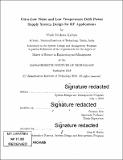Ultra-low noise and low temperature drift power supply system design for RF applications
Author(s)
Kalluru, Vivek Venkata.
Download1341996122-MIT.pdf (3.746Mb)
Other Contributors
Massachusetts Institute of Technology. Engineering Systems Division.
System Design and Management Program.
Terms of use
Metadata
Show full item recordAbstract
This thesis started off with an investigation of noise performance of bench power supplies and existing commercial off-the-self Low Drop Out (LDO) regulators used as power sources in radio frequency applications. Noise of power supply contributes to the phase noise of RF transceivers. The temperature drift affects the precision of analog baseband. Though some commercial LDOs show very good noise performance over bench power supplies they cannot be readily integrated into cost effective and widely used CMOS process, because they are realized in expensive technologies and they need off-chip components to filter low frequency noise. A novel circuit technique to correct the temperature drift and achieve low noise performance is proposed. The temperature drift caused by negative second order temperature coefficient in traditional voltage reference is effectively compensated by generating positive second order temperature coefficient using MOS transistor current. The simplicity of the scheme contributes to power efficiency and low noise. This topology is simulated in 65nm CMOS process which makes this a readily integrated solution to chip-scale RF applications requiring high degree of precision. A temperature coefficient of 2ppm/°C is achieved in simulation which is a 7X improvement over commercially available solutions. Another major advantage is ultra low power consumption of this topology. The current consumed by this topology is less than 1pA which makes it ideal for battery powered systems. The simulated integrated peakpeak noise is 0.1pV in 0.1Hz - 10Hz frequency band which is a 1OX improvement over commercially available parts. This design does not use any discrete components to reduce low-frequency noise. A power supply rejection ratio of 76dB is reported in simulation which shows its excellent immunity to noise from input voltage.
Description
Thesis: S.M. in Engineering and Management, Massachusetts Institute of Technology, Engineering Systems Division, System Design and Management Program, 2019 Cataloged from PDF version of thesis. Includes bibliographical references (pages 47-48).
Date issued
2019Department
Massachusetts Institute of Technology. Engineering Systems Division; System Design and Management Program.Publisher
Massachusetts Institute of Technology
Keywords
Engineering Systems Division., System Design and Management Program.